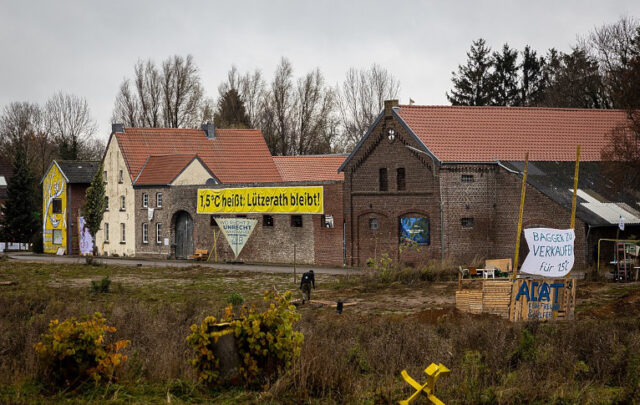As a number of you know. I am a banker. I’ve been financing projects in the energy sector for close to 15 years. I’m aware this diary can and will be seen as self-serving, and indeed it is. But I hope it will also be seen as a useful explanation.
Banking has always been both a utility and a casino. On the one side, you have the vast payments and cash management network, the retail business, the basic corporate lending or brokerage business and a lot of advisory work. On the other, you have the more market driven activities, the support and/or participation to corporate mergers & acquisitions, commodities and securities trading, all the way to own-account speculative risk-taking. The two used to be mostly apart (indeed, the Glass-Steagall Act kept them legally separated), but the line has become increasingly blurred.
My job puts me in that blurry zone: my deals are of the large, multi-million (or even billion) kind, they can have pretty complex structures and make use of various hedging instruments, and they require pretty specialised competences. But they are also old-fashioned loans, which remain on our books for the long term, and are directly used for a visible purpose (like wind farms).
Thus, I’m usually seen as an investment banker by my clients, as I provide “structured debt” – but I’m seen as an stodgy, boring drone by the capital market guys, as my loans are not tradeable, and the banks – and maybe more importantly, the bankers – do not make extravagant amounts of money on the deals.
In fact, this is the one thing that I explain first when describing my job: we’re typically going to earn a margin on our loans of 1-2% per annum (it was less than that in the exuberant times before the crisis, it’s above that now). That amount will not change if the project works spectacularly well: we do not get any of the potential upside. But if the project we finance does not work, we stand to lose the whole thing. Given the unbalanced potential outcomes, we have to ensure that the decent-to-excellent outcomes happen almost all the time, and the bad outcomes happen only very rarely (basically with a less than a few % chance overall). Which means understanding what we’re doing, to make sure that we’re not taking risks, even rare ones, that could bring us down.
So the goal is to identify all the things that could go wrong, understand how they can be resolved or mitigated and by whom, and make sure that the party that can deal with the problem is contractually committed to doing so at the relevant moment, and is actually around to do it if and when. That means knowing the parties to the project, understand what they can do and what they want to do, and negotiate the best possible allocation of responsibilities and remuneration. The investor is generally looking to maximise its likely revenues from a project; we’re looking (or we should be looking) to minimize the potential losses. The two goals are, thankfully, not incompatible, but require a lot of fine tuning on what are large scale complex projects.
At heart, a banker’s job is risk analysis and allocation. Technical risks should go to the specialised contractors. Statistical risk should go to the insurers. Price risk can be borne by the investor or hedge on the markets, when available. Regulatory/political risk and operating risk are typically shared with the banks, to some extent.
A banker has to know its client, the industry and markets it works in (both for supplies and sales) and anyone who might have a stake or threaten the project. This requires a lot of due diligence, research, and coordination with lots of stakeholders. It’s not quite dull or boring, but it’s information-intensive and not easily summarised in a rating or a price (a major cause of the crisis was too many people putting too much trust in ratings and not doing their own risk assessment).
And it’s very explicitly done on the basis of long term relationships. I’ve been bumping into the same people (both in other banks and on the client’s side) for the past 15 years. My main clients this year were already clients 5 years ago, and I’ve talked to the same people there throughout. Once a deal is signed, I am still involved in its long term life – actively during the construction period, less so when projects become operational, more so when a restructuring is needed (like in 1998 when the Russian government imposed a moratorium on the payment of private debt): in other words, I have to live with the consequences of the deals I negotiated – which is a really useful experience to have to negotiate the next ones…
In the past 15 years, I’ve already gone through 3 cycles where my job was mocked for being a thing of the past, to be swept away by nimbler capital markets transactions. First, it was the emerging markets craze in the mid-90s – corporate bonds would replace all these cumbersome project-by-project loans to build power plants in Thailand or India. Then it was the dotcom boom – in that case, the job was not threatened, just seen as an idiotic way to spend your time when you could make millions working on dotcom IPOs. Then it was the big securitization craze of the past few years. Why immobilize precious balance sheet resources on low-paying loans when you could slice’n’dice assets, transform them into tradeable paper, and sell it off, thus freeing capital to start all over again and make money several times over?
In the first two cases, the bubbles burst, the “new” new thing crashed, and banks were happy to notice that their stodgy lines of business had not crashed along, were still making money, and were worth supporting. This time, the bubble has been so big, and the damage from the crazy activities so wide, that the banks are so badly wounded and their ability to support “normal” banking is now compromised.
Activities like mine have (once again) not lost any money, but they are being squeezed this time by the weakness of the banks. I wrote a few weeks ago of the contorsions I had to go through to get a deal done late last year. This is due to the fact that a number of banks have been involved in both speculative and utility type activities, and their losses on the speculative side of the business are so large as to threaten their ability to continue their utility businesses. But it also the case that even the banks that did not get involved in speculative activities (or had a prudent enough approach to these) are in trouble, because they also need to finance themselves on a daily basis on the interbank market and that market has been damaged by the weakness of so many of the imprudent banks.
I can’t write about local bankers that lend to their community (both mortgage type lending and small business lending), but I presume that their stories would be fairly similar: they knew what they were doing, have not incurred any unusual losses, but are now forced to reduce their activity, and choke clients off, because of the overall context, and their banks’ retranchement measures. It can indeed be argued that banks are being as stupid and sheep-like in their rush to deleverage as they were in the previous rush to expand and grow on the upside of the bubble, under the influence of market forces.
The lesson of all that is that there needs to be a separation once again between the utility bits of banking, and the speculative bits – and, rightly or wrongly, I consider myself to be in the utility part. Both are – or at least, can be – useful, but only one is absolutely necessary, and that fact (the absolute need for a sound basic banking system) cannot and should be hijacked to protect the speculators from the consequences of their bets.
There are two ways to do this: separate the to activities hermetically (by identifying what is seen as vital, and forbidding anybody who is active on the speculative side of business to even touch the utility bit), or regulate all finance-related activities. Ian Welsh has proposed a fairly simple way to regulate CDSs. I have suggested a more macro regulatory measure: tax high incomes much more. In either case, it means have rules in place and enforcing them – that last bit being the most vital one, and the hardest one given the finance industry’s permanent lobbying to dismantle rules and to weaken the regulatory agencies (which can then conveniently be blamed for not doing their job, as we regularly read these days).
Bankers should be – and in many cases are – like attorneys or doctors: in the midst of their community (which can be sophisticated industrial players), providing highly qualified, specialised services, and earning income in the same kind of range as their clients. High flyers can go in the unregulated speculative side of the business, and trade and wheel-and-deal to their content, with whatever money investors see fit to trust them with, but they should be in no position to threaten the livelihood of the utility side of the business, nor expect to be bailed out when they crash and burn.
Bankers need – and deserve – that protection and discipline, because it is what protects society and the economy from the potential abuse of the incredible privilege that is granted to all those with their hand directly on the money tap.
Full disclosure: I earn a 5-figure salary, and also received a 5-figure bonus this year.





